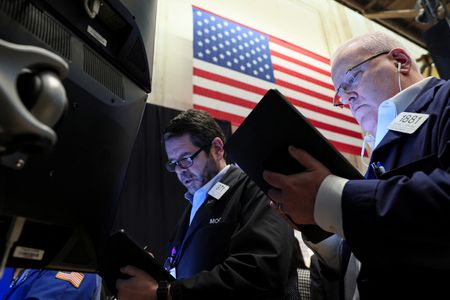
By Bansari Mayur Kamdar and Sruthi Shankar
(Reuters) -U.S. stocks fell on Monday as bond yields surged to three-year highs on expectations of an aggressive tightening in monetary policy, while financials rose after Bank of America rounded out earnings for big Wall Street banks with a profit beat.
Market participants are bracing for a barrage of earnings this week that will help them assess the impact of the Ukraine war and a spike in inflation on company financials.
The broader S&P 500 banks index rose 1.2%, lifted by a 3% gain in shares of Bank of America Corp.
The second-largest U.S. bank by assets reported strong growth in its consumer lending business, although its investment banking unit took a hit from a slowdown in deal-making.
“The earnings season so far has been living up to its expectations,” said Peter Cardillo, chief market economist at Spartan Capital Securities in New York.
“There have been some negative guidance but, at large, it looks like corporate America is likely to be able to live with higher inflation and the higher cost of money.”
Market response to bank earnings has been mixed as JPMorgan Chase & Co, Goldman Sachs Group Inc and Citigroup Inc have set aside a combined $3.36 billion to cover loan losses due to risks from the Ukraine war and rising inflation.
Earnings of Netflix, Tesla Johnson & Johnson and International Business Machines will be in focus as they are scheduled to report later this week.
Megacap stocks such as Apple and Amazon.com slipped as the benchmark 10-year Treasury yield climbed to 2.850%, after hitting 2.884% earlier on Monday, the highest since Dec. 2018.[US/]
Shares of market-leading technology and growth companies have come under pressure recently as expectations of a string of interest rate hikes threaten to erode their future earnings.
Tesla, however, rose 1.2% as it prepares to reopen its Shanghai plant following a near three-week COVID shutdown.
Eight of the 11 major S&P sectors were lower. Defensive healthcare fell more than 1% after rallying to record highs this month amid concerns about slowing economic growth.
Energy stocks rose 0.9% as crude prices rose and Brent topped $113 a barrel, as outages in Libya deepened concern over tight global supply. [O/R]
Overall, trading volumes were thin after the Easter break, with European markets remaining shut on Monday.
At 11:46 a.m. ET, the Dow Jones Industrial Average was down 77.55 points, or 0.23%, at 34,373.68, the S&P 500 was down 10.35 points, or 0.24%, at 4,382.24, and the Nasdaq Composite was down 63.22 points, or 0.47%, at 13,287.86.
Charles Schwab Corp fell 8.6% after the financial services company missed quarterly profit estimates.
Twitter rose 4.8% as the micro-blogging platform adopted “poison pill” on Friday to restrict Tesla CEO Elon Musk from raising his stake to beyond 15% for a one-year period.
Didi Global Inc slumped 13.8% after the Chinese ride hailing giant said it will hold an extraordinary general meeting on May 23 to vote on its delisting plans in the United States.
Declining issues outnumbered advancers for a 1.76-to-1 ratio on the NYSE and a 2.36-to-1 ratio on the Nasdaq.
The S&P index recorded 23 new 52-week highs and 18 new lows, while the Nasdaq recorded 42 new highs and 317 new lows.
(Reporting by Bansari Mayur Kamdar, Sruthi Shankar and Amal S in Bengaluru; Editing by Arun Koyyur and Anil D’Silva)

